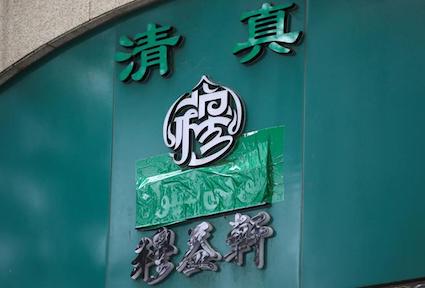The Campaign To ‘Sinicize’ Religion In China Through The Removal Of Arabic Symbols In Beijing

Katie Clarke, The Organisation for World Peace
On Wednesday of this week, a campaign in Beijing ordered restaurants and food stalls to remove Arabic script and symbols associated with Islam to ensure religions are conforming to mainstream Chinese culture – reported Al Jazeera. One manager who spoke to Al Jazeera said that Government officials said, “[…] this is foreign culture and you should use more Chinese culture […]”. Reuters also reported that employees at 11 restaurants and shops in Beijing selling halal products were visited by officials and instructed to remove images associated with Islam, such as the crescent moon and the word ‘halal’ written in Arabic, from signs. This arguably antagonistic move is part of a national effort to ‘sinicize’ the Muslim population into Chinese culture.
The Washington Examiner reported that the campaign to ‘sinicize’ religion was first recognised in 2015 when President Xi Jinping passed a policy which ordered religions to conform to Chinese culture and the Chinese Communist Party. sinicization is whereby non-Chinese societies come under the influence of Chinese culture, and may refer to policies of acculturation, or cultural imperialism imposed by China onto neighbouring East Asian countries, and in this case minority ethnic groups inside China. Islam has been particularly targeted, as earlier this year China passed a five-year plan to sinicize Islam, aiming to – as reported by The Straits Times – ‘guide Islam to be compatible with socialism and implement measures to sinicize the religion so as to foster patriotism’.
Article 36 of the Chinese constitution states: “Citizens of the People’s Republic of China enjoy freedom of religious belief.” However, while religious belief in China is protected by the constitution, Sophie Richardson, the Human Rights Watch’s China director, and reported by The Council on Foreign Relations, said “[…] the measures do not guarantee the right to practice or worship.” She adds that religious practices are limited to normal religious activities, though ‘normal’ is left undefined and can be broadly interpreted. China is home to approximately 20 million Muslims, and although the constitution guarantees freedom of religion, we are witnessing unequivocal discrimination against religious institutions by the government in order to bring the faithful into line with Communist Party ideology.
The state recognises 5 religions: Buddhism, Catholicism, Daoism, Islam and Protestantism. However, with the newly appointed five-year plan and the campaign to remove Arabic script and symbols, and through the additional removal of underground Christian churches and crosses, the government has intensified the clampdown on religious freedom across the country, as they fear religious institutions are becoming tools of foreign influence and ethnic separatism – reported by South China Morning Post. In addition to the removal of Islamic scripture, The Independent also reported that several human rights groups and the United Nations have expressed their concerns over the ‘re-education’ camps that are detaining more than a million Uyghur Muslims. Here people are forcibly indoctrinated with the Communist Party’s agenda and psychologically tortured to deny their faith. Additionally, The Uyghurs, a Turkic Muslim minority group in Xinjiang, Western China, who are not in camps are still under constant surveillance via spyware on their phone or facial recognition devices throughout the city. China vehemently denies the existence of the camps, and calls them “pure fabrications”, but justifies the surveillance of Muslims in order to suppress what they believe to be ‘religious extremism’ – as reported by The Independent.
The irony being shown is blatant, because although article 36 in the Chinese constitution expresses freedom of religious beliefs, it appears this freedom ceases to exist when people begin to practice that religion. Millions of people suffer once religion is celebrated, with President Xi Jinping in 2015 saying, “[…] we should actively guide religion to adapt to a socialist society”, in other words, this translates into making Muslims practice their faith in a more Chinese way, incorporating the Chinese culture, but at the detriment of their own cultural beliefs. The suppression of religious expression that is dispersing across China is causing cultural unrest for many believers who are being prevented from living their life via their chosen religion. China must realise that items included in the constitution must be followed through with positive action, allowing multiculturalism to shine through and not be dimmed by obtrusive discrimination.

